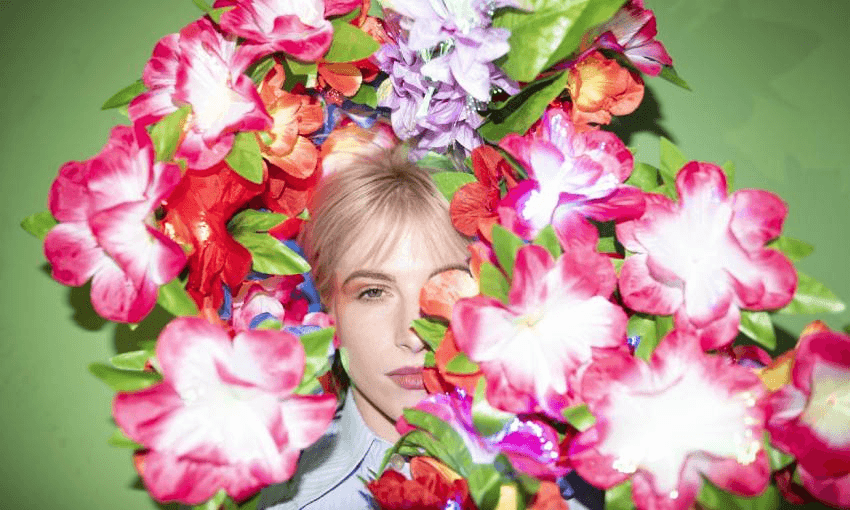With the third and final instalment of Petals for Armor, Hayley Williams has completed the extended birth of a very large child. She talks to Josie Adams about graduating from emo to goth.
Our introduction to Hayley Williams, solo artist, was ‘Simmer’. Working from the vocals up, the song pulses, breathes and viscerally dissects the rage a woman can feel. “Rage is a quiet thing,” she sings, holding the anger back in her throat.
It’s the first time she’s driven every stage of musicianship in an album; in Paramore, the music was usually written before her vocals. On Petals for Armor, her singular voice remains her best instrument: it builds melodies and rhythms with sharp staccato sentences, lingering breaths and a volume that never whispers, never belts, but grazes the edges of both. The result is very different from the loud, occasionally bellowing pop-punk vocals of her band.
“I knew that I was being more experimental with musicianship and instrumentation, and I knew I was using my voice to start songs from scratch,” she says of the different way these songs were built. “But Paramore’s always written from the heart, we’ve always followed our whims. Wherever we want to go, we do it without apology, and that same sort of attitude and spirit went into making Petals for Armor.”
Williams is calling from the front yard of her Nashville home, where she’s been for two months. Her Paramore bandmates all moved to LA before the pandemic hit. “We’re not even able to social-distance hang with each other,” she says. “I miss everybody being together. But we’re doing what we can, and everyone’s just trying to focus on staying healthy, and on their mental health.” She’s got her goldendoodle, Alf, for company.
For her mental health, she has the album. Released in three stages, it’s an emotional journey from anger to peace and empowerment. Williams found it cathartic. “It ended up being 15 songs and six months of my life writing as therapy, and processing out things that I’d experienced.”
The first third of Petals for Armor seethes: there’s ‘Simmer’, then there’s ‘Cinnamon’, a Kasabian-meets-Björk-meets-St-Vincent but entirely Hayley Williams headbanger about the aggressive femininity of her home.
While Williams’ attitude is still true to the Paramore creed of emotional honesty, these songs celebrate femininity more than the band has done. “For me, it was really hard to get to my femininity. I grew up in a band with all my friends, who were all boys, and we grew up to be adults and I was the only woman surrounded by men,” she says. “It took a lot of upheaval, a lot of really digging through my own shit and being honest with myself about what it looks like when Hayley is feminine and taps into those powers and qualities that are so unique to being feminine.”
The result is dark pop, indie-goth, whatever you call it; it crawls along your skin instead of burning it like early-days Paramore. You’ve graduated from emo to goth, I tell her, and she chuckles. “Yeah, I’ll take that! I spent most of my teenage life, as well as my 20s, trying to be so tough,” she says. “I give my younger self a lot of credit, because it’s tough to be tough, but it’s the tool that I had at the time.”
“As I’ve got older I’ve realised there are other ways for me to express myself and other ways for me to fight for myself other than angsty, superhero attitudes. It’s nice to be gentle with myself and nice sometimes to just tell someone what’s going on. And it actually gives me a lot of strength to be that way.”
That doesn’t mean she regrets or resents her past self. On Petals for Armor II she has a goth-reggae ode to it, ‘Dead Horse’. Her old music, too, is still something she celebrates. Paramore can’t go back and repeat its early days, but they were right for the time. Petals for Armor is right for now. “If we had success with ‘Ain’t It Fun’, or even back in the day with ‘Misery Business’, and kept trying to recreate that success with that sound, I really don’t think we would have lasted,” she says. “I think we would resent the band, and I think we wouldn’t be here.”
Her sound at the moment had a Radiohead/Portishead vibe: experimental, dark and simmering. There’s an essence of Björk in its sharp humanity, and in the blank-then-coloured canvases of her music videos. “I get so giddy when people bring up Björk in our interviews, because I never thought I’d get a chance to talk about my love for her music and her artistry and how much she’s inspired me.”
It turns out these musicians are big influences for not just her solo project, but also the band. “All of us in Paramore have loved Radiohead and Björk since day one, but it doesn’t always come out.” Well, it’s come out now; especially in the music videos.
“I was meant to make a video for Roses/Lotus/Violet/Iris with Kristen Stewart, who’s an incredible writer. We all know her as an actress, but she’s a wonderful writer and director, and she’s written a beautiful treatment and storyline for a video I hope we’ll get to make one day,” she says. “It’ll just be a little bit late.”
In the meantime, she’s pulled together the A-team to figure out how to best perform during a pandemic. She’s recruited Joey Howard, the bass player for both Paramore and Williams’ solo project band, and Mike Kluge, who’s worked on visual effects for Paramore in the past. “It’s one thing for me to play guitar in my living room on Instagram Live, but I’d rather try to create an experience for people – the closest thing to a live show that they’re gonna get.”
The third and final instalment of Petals for Armor is out today.
